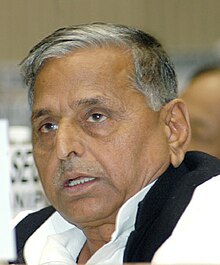User:!777francis777!/Caste politics
| This is the sandbox page where you will draft your initial Wikipedia contribution.
If you're starting a new article, you can develop it here until it's ready to go live. If you're working on improvements to an existing article, copy only one section at a time of the article to this sandbox to work on, and be sure to use an edit summary linking to the article you copied from. Do not copy over the entire article. You can find additional instructions here. Remember to save your work regularly using the "Publish page" button. (It just means 'save'; it will still be in the sandbox.) You can add bold formatting to your additions to differentiate them from existing content. |
Article Draft[edit]
Notes[edit]
- It seems like the article could be reorganized by having the history portion be at the start.
Lead[edit]
Article body[edit]

- Add more images. You can import some from Caste system in India. (GA Review)
- Add to "Caste-based mobilisation" section
- Rewrite the Lead to include a better overview of the content covered by the article.
- In India, a caste is a (usually endogamous) social group where membership is decided by birth.[1] Broadly, Indian castes are divided into the Forward Castes, Other Backward Classes, Scheduled Castes, and Scheduled Tribes. Sometimes Indian Christians and Indian Muslims may also function as castes (a full list of castes can be found at the end of this article). With castes separating individuals into different social groups, it follows that each group will have conflicting interests; oftentimes putting those with lower social standing in less favorable positions. An attempt to address this inequality has been the reservation system, which essentially acts as affirmative action to provide representation to caste groups that have been systematically disadvantaged. There have also been other cases where political parties, like the Bahujan Samaj Party (BSP), was formed to challenge the power of the upper castes.
- The role that castes play in India's political system was institutionalised by the British colonist where upper-caste dominance within government was perpetuated and reinforced. Although there were efforts to address this discrepancy through measures like the Communal Award and educational empowerment (see ‘Sanskritization’), this remained the status quo until the 1990s when an economic liberalisation in India diminished state control and fueled the rise of caste-centric parties focused on empowering lower castes. However, these parties were often rife with corruption as it was seen as a way to level the playing field. Leaders of what came to be known as 'caste mafia' took advantage of lower caste dissent towards upper caste institutions and openly robbed state institutions.
- Caste not only determines one's role in political institutions; it also influences access to resources like land as well as police and judicial assistance.[citation needed] Despite the traditional dominance of upper caste parties, the concentration of lower caste individuals in specific areas can lead to regional dominance, impacting political representation. However, this mainly impacts male members of the lower castes as women from lower castes have traditionally been excluded from participating in the political sphere.[citation needed] This discrimination has continued in recent times as women from lower castes are continued to be looked down upon for their low educational levels as well as the sex work most resort to in order to support their families. Organizations such as the Gulabi Gang as well as the United Nations are currently working to improve lower caste women's social mobility and independence.
- Add a table/chart for which parties are associated with each caste. (GA Review)
From GA Review: "Which parties are associated with each castes, for example? One of the things I'd expect to find here would be an answer to this, perhaps in a nice table / chart format. If some information on which party is related to which caste is present in this article, it is most certainly not found in one place"I will create a table with a list of political parties that are associated with the main five classes as listed out by the article "Caste system in India" under "Varna" under "Definitions and concepts". These classes are: Brahmins, Kshatriyas, Vaishyas, Shudras and Dalits
I've decided to not make this edit because it is very difficult to find out which caste a political party is associated with as most parties have members from a variety of castes. It's not a clear
- Rewrite History Section (GA Review)
- Make it more chronological and move it to right after the lead.
- The Political Corruption Section also needs a lot of citation. Also, it contains a section that does not talk about corruption at all and should be moved elsewhere.
- Also, I don't think that the political corruption section belongs in History. It should be in caste and political power.
- Talk more about some of the other castes. (GA Review)
- From GA Review: "Worse, untouchables are mentioned once outside the lead; Brahmin's - three times, and other castes like Kshatriyas, Vaishyas and Shudras are not even mentioned in the article at all! "
References[edit]
- ^ "Study reveals origin of India's caste system". The Times of India. 11 August 2013. Retrieved 21 January 2019.
